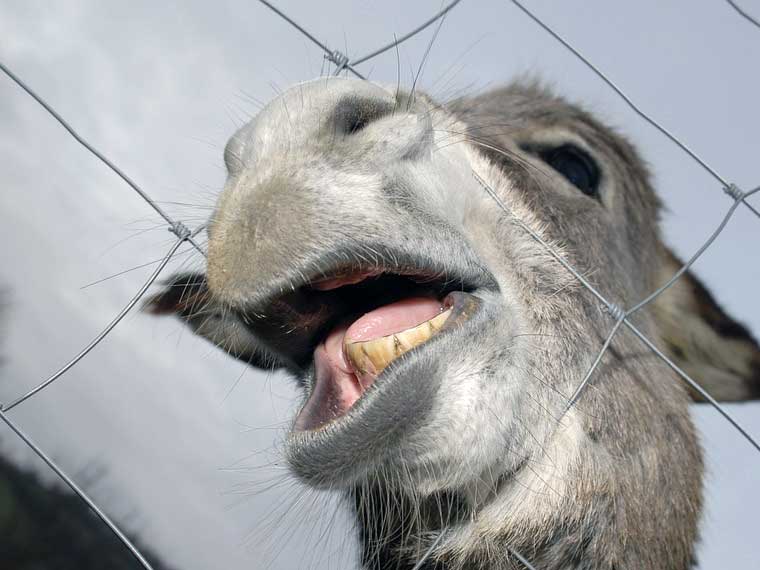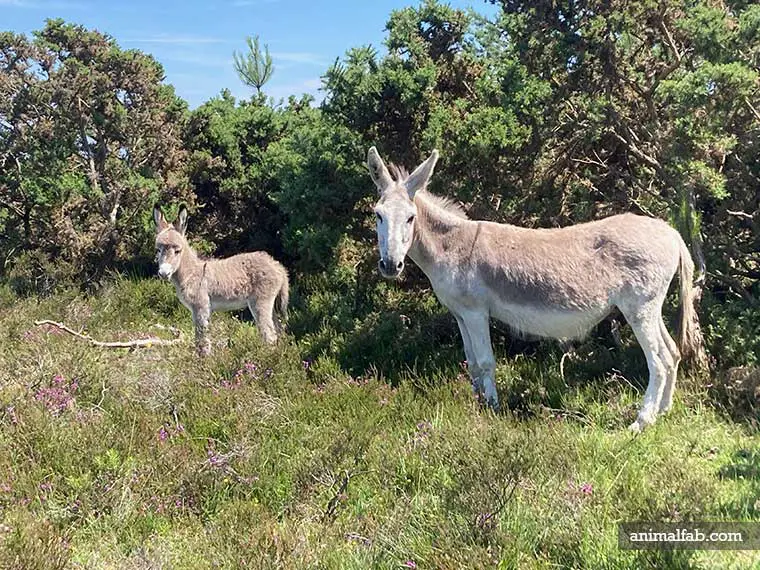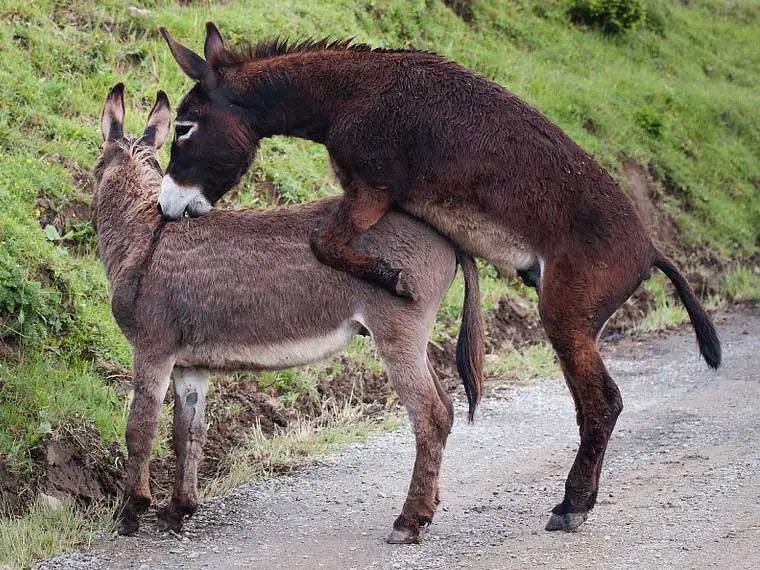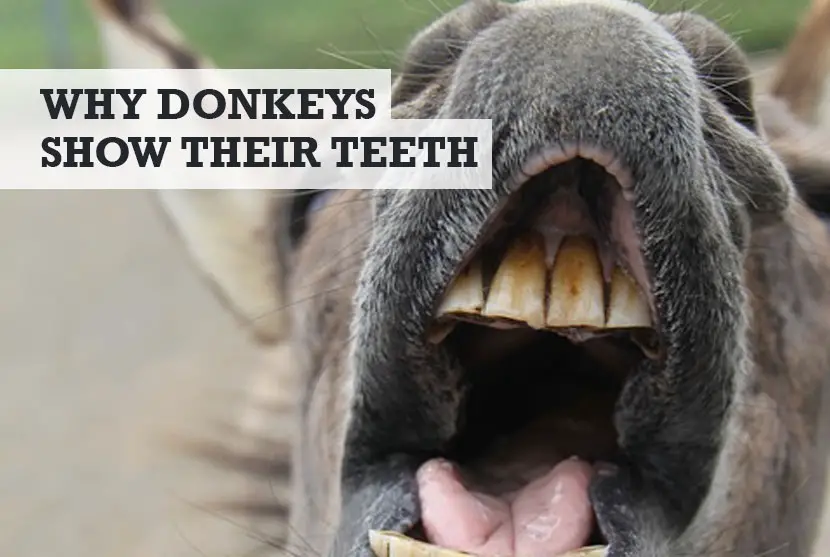If you’ve ever been up close and personal to a donkey, you will have noticed how they often bare and show their teeth. It can either be amusing with that big toothy smile, or you might find it intimidating.
There are a few reasons why donkeys show their teeth, including times you might need to be concerned about it. Here’s the short answer first.
Why do donkeys show their teeth? Donkeys show their teeth to help them smell. By twisting the brim of their lips up, they can absorb the smell and relay it to their mouth. The olfactory system is located at the roof of their mouth and will sort and process smells, and
This is the primary reason why donkeys smile like that and show their teeth.; it’s called the Flehmen response and is all to do with smells. The olfactory system helps donkeys to create memory associations just how people do.
Apart from donkeys smiling and showing their teeth as a basic response, there are other reasons why a donkey shows its teeth. These reasons are described below.

What does it mean when donkeys show their teeth?
A donkey’ teeth and mouth are very big compared to the size of their head. When a donkey is calm and relaxed, you might be able to see the teeth at the bottom of their jaw. However, to see the donkey’s full set of teeth, they need to do that smile where they bring their top lip up.
The act of a donkey showing his teeth can be for passive or aggressive reasons.
1. Showing teeth due to the Flehman response
The most common reason for donkey’s showing their teeth is the process is referred to as the ‘Flehman response’, as defined by Biology Online below.
A behavior in certain animals wherein the animal curls back the upper lip thereby exposing the front teeth, to facilitate the transfer of scents and pheromones into the vomeronasal organ above the roof of the mouth.
Biology Online, www.biologyonline.com/dictionary/flehmen-response
Donkeys aren’t the only animal at show their teeth. You will see horses doing a very similar action. Other animals, especially hoofed mammals, twist their upper brims in the same manner as donkeys.
When exhibiting this behavior, the organ they’re triggering is known as the vomeronasal organ.
Intriguingly, donkeys and other animals that exhibit this behavior don’t always do so because of smells. In some cases, the behavior is exhibited in response to something they catch sight of.
For example, this fantastic account of a young horse entering a social situation for the first time, perfectly sums up how this would also work with a donkey.
A young gelding turned out for the first-time trots optimistically towards his new pasture-mates. Out of the herd swaggers the “alpha male” of the gelding group, neck arched and ears flicking back and forth. He meets the newcomer nostril to nostril, and both breathe deeply of the other’s scent. A couple of squeals ensue from the contact, then, introductions having been made, the alpha gelding accepts the new horse as a submissive youngster who won’t be a threat to his position, and the youngster immediately acknowledges the elder as his new leader. With the pecking order thus established, peace reigns in the herd.
The Horse, https://thehorse.com/13971/equine-sense-of-smell/
A donkey’s sense of smell is very similar to that of a horse, so we can apply the same logic. When donkeys approach each other, they will blow up their noses, lips back, teeth showing, and making sure they are no-threat to each other.
At this point, the donkey can maintain this posture for a few seconds. The duration for this depends on the circumstances and the donkey itself!

Did You Know? Donkeys and horses can actually mate successfully to produce a hybrid offspring.
2. Showing teeth due to aggression or fear
Donkeys will also display their teeth when they feel threatened or afraid. If this happens, be careful and move far back to avoid sustaining injuries from your angry donkey. You wouldn’t want to receive a kick from an angry donkey!
Handy Hint: There’s a common misconception that donkeys hate dogs. There’s more to it than that though.
They might even show their teeth due to something they can smell that is far away. Donkeys have a brilliant sense of smell compared to people and can smell things we can’t at long distances – such as a predator.
Here’s another account where horses do similar which you could also apply to a donkey baring his teeth and flaring his nostrils.
A group of horses graze in a valley. 50 yards from the herd, even the stallion seems relaxed, until he suddenly flings up his head. Nostrils flaring, he’s instantly on full alert, although his eyes can’t perceive any visible threat. The faint predatorial scent of a cougar has registered in his olfactory sensors, it’s time to get his herd moving away from the danger.
3. Showing teeth due to sexual arousal
When a male donkey wants to with his female counterpart, he can often show his teeth. Again, this is due to the donkey’s sense of smell, as the male tries to determine the reproductive state of the female through smelling its pheromones.

4. Showing teeth due to colic or sickness
When a donkey has colic, he might start to grind his teeth and curl up his top lip. Since we also know that baring teeth and lip-curling is also a sign of sexual arousal, you should try to rule anything else out.
The website of the UK Donkey Sanctuary charity say signs of colic in a donkey include the following:
- Dullness.
- Lying down.
- Lack of appetite or refusing to eat.
- Weight shifting, usually between the hind legs.
- Rolling and pawing at the ground (rare in donkeys, can indicate a serious problem.
- Fast breathing, rapid heart rate.
- Sweating.
- Brick red or pale gums or insides of eyelids.
- Dry or tacky gums.
- Lack of, or reduction in, the normal quantity of droppings.
- Self-isolating or moving away from companions.
5. Showing teeth after giving birth
Another time when donkeys like to display their teeth is when smelling their newborn foals. Female donkeys can also exhibit this behavior when smelling the watery substance after giving birth.
Picture the scene: a Jenny lies in the straw, lovingly licking dry her newly born foal. As she does so, she breathes newborn’s scent in deeply, memorizing it so that she can identify the foal as hers out when out amongst the herd.
If you know that your donkey is pregnant, you can expect this behavior once they give birth. Here’s how you know they are approaching the due date.
Handy Hint: Donkeys will quickly become unhappy if they don’t have enough space and land to graze on.
6. Showing teeth due to dental issues
One over possible reason why a donkey shows his teeth could be due to a dental problem. Perhaps there is some food stuck between the teeth or they have some pain due to irritation – try to rule it out.
7. Showing teeth to asserting authority
The male jacks like to show their teeth if they smell the urine of rivals within their territory. It’s a way of them demonstrating that they are ready to protect their territory at all costs.
8. Showing teeth when they’re expecting food
Domestic donkeys are accustomed to a feeding schedule, and it will often be the smell of the food the sense first, before you’ve even come into their area.
So, there you have it.
As shown, most of the time, teeth baring is related to smell. It can also be related to fear and aggression though…
How do you know if a donkey likes you?
Traditionally, donkeys are friendly and loving animals. Consequently, there are many signs to look at to know if your donkey likes you and has trust in you.
For instance, your donkey can stand near you perhaps as a way of attracting your attention. This is a sign that your donkey likes you (and can sometimes including a gentle braying sound).
Also, you can know that your donkeys like you if they enjoy leaning towards you for a cuddle. Here’s all the ways you can tell in full.
How do you know when a donkey is mad?
Generally, donkeys are extremely caring, friendly, and playful creatures. However, at times your donkeys can be angered and want to be left alone. But how do you know when your donkey is mad? Well, there are signs and indications to look out for to know this, such as:
- Teeth baring and snorting.
- When they’re braying in a distressed manner.
- If they’re constraining their ears backwards near their neck.
- If they’re lifting one of the legs.
- If they’re swiftly whizzing their tail.
What happens if a donkey bites you?
Donkeys do not have a reputation for aggression. Nevertheless, this doesn’t mean that they can’t cause harm through aggressive actions like biting and kicking.
So, what happens if your donkey bites you? First, if this happens, you should ensure you clean the bitten part using soap and water. Once the wound is clean, you can smear an antibiotic gel and wrap the wound using a clean plaster.
If the injury you sustained from the bite is a deep puncture or swells, seek immediate medical care.
Conclusion
Donkeys are great animals and live up to their reputation of being gentle and affectionate. Often that will be displayed by them showing you their teeth so they can get a good smell of you.
Just be wary though, as it’s not always going to lead to a positive response.
You might also like…
Image in header via https://pixabay.com/photos/donkey-animal-smile-farm-mule-4803375/

